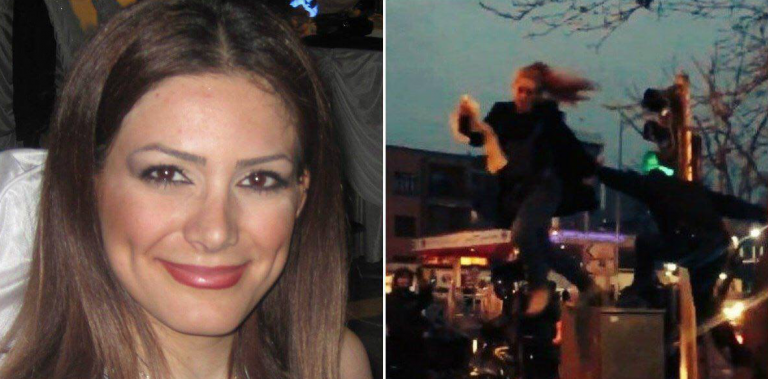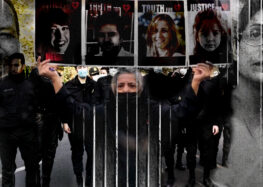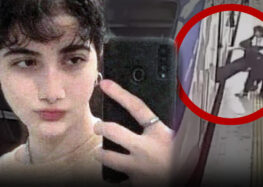Second Iranian Woman Sentenced to Prison for Protesting Mandatory Hijab
 University student will spend a year behind bars for “encouraging corruption”
University student will spend a year behind bars for “encouraging corruption”
Maryam Shariatmadari, one of the “Girls of Revolution Street” protesting against mandatory hijab for women in Iran, was sentenced to a year in prison on March 25, 2018 by Branch 1091 of the Tehran Criminal Court for “encouraging corruption by removing her hijab,” her lawyer informed the Center for Human Rights in Iran (CHRI).
“I’m utterly shocked that she has been sentenced to a year behind bars only because she protested against forced hijab,” said human rights attorney Nasrin Sotoudeh in an interview on March 26. “I would like to compare this ruling with the one against Saeed Tousi.”
Tousi, one of Iran’s Supreme Leader Ali Khamenei’s favorite Quran reciters, was cleared of sexual abuse against his underage students in January 2018, only after the supreme leader intervened, resulting in the dismissal of his four-year prison sentence.
“We have seen how cases similar to Saeed Tousi’s are dealt with in societies that use moral excuses to put greater restrictions on women and have greater respect for gentlemen,” Sotoudeh said. “I have had such cases in the past. There was the case of a young girl who was being taken advantage of by her father but the courts strangely ignored it. Now this same court system is issuing heavy and unexpected sentences against women for removing their headscarf.”
“I don’t think you can’t quell protests against mandatory hijab by imposing such unusual sentences outside legal and judicial frameworks,” she added. “Protests against the mandatory hijab are here to stay. The only way to deal with them is to pay attention.”
Shariatmadari, a 32-year-old computer science student at Amir Kabir University in Tehran, was arrested on February 25, 2018 after being injured when she was pushed by a policeman off a utility platform where she was waving her headscarf in protest against forced hijab.
She is the second woman sentenced to prison in recent weeks for demanding the right to choose what to wear in public.
On March 7, 2018, sociology student Narges Hosseini, 32, was sentenced to 24 months in prison — 21 months suspended for five years — for the charges of “encouraging people to engage in corruption by removing the hijab in public” and “committing a forbidden act in a public space.”
The sentence has been appealed, Sotoudeh told CHRI.
“Today [March 26] I, along with another lawyer, went to court and filed an appeal against this unexpected and unfair sentence against Narges Hosseini. We hope the court will pay attention to our arguments and confirm my client’s innocence,” the human rights lawyer said.
Sotoudeh, also represents Shaparak Shajarizadeh, another woman arrested for protesting against forced hijab. Her trial has not yet been held but she has been accused of charges similar to those against Hosseini and Shariatmadari, the lawyer said.
The protesting women have been named the “Girls of Revolution Street” ever since Vida Movahed stood on top of a utility box on a busy sidewalk on Enghelab (Revolution) St. in the center of Tehran and waved her white headscarf on a stick in late December 2017 as part of the “White Wednesdays” campaign. That campaign was launched by exiled journalist and civil rights activist Masih Alinejad to encourage Iranian women who oppose mandatory hijab.
On March 8, International Women’s Day, Iran’s supreme leader described demonstrations against the country’s compulsory hijab rule as “small and insignificant.”
“They [enemies of Iran] spent all that money and created all that propaganda to trick a few girls into taking off their scarves, but in the end, what they got from all that effort was small and insignificant,” said Khamenei.
The supreme leader continued: “But that’s not something I’m concerned about, as much as some of our own elite, which are raising the issue of the so-called forced hijab. These elite, which include journalists, pseudo-intellectuals and clerics, are going in the same direction as the enemy… I hope to God they are not doing so consciously.”
According to Article 638 of Iran’s Islamic Penal Code, “Anyone in public places and roads who openly commits a harām [sinful] act, in addition to the punishment provided for the act, shall be sentenced to two months’ imprisonment or up to 74 lashes; and if they commit an act that is not punishable but violates public prudency, they shall only be sentenced to 10 days to two months’ imprisonment or up to 74 lashes.”






